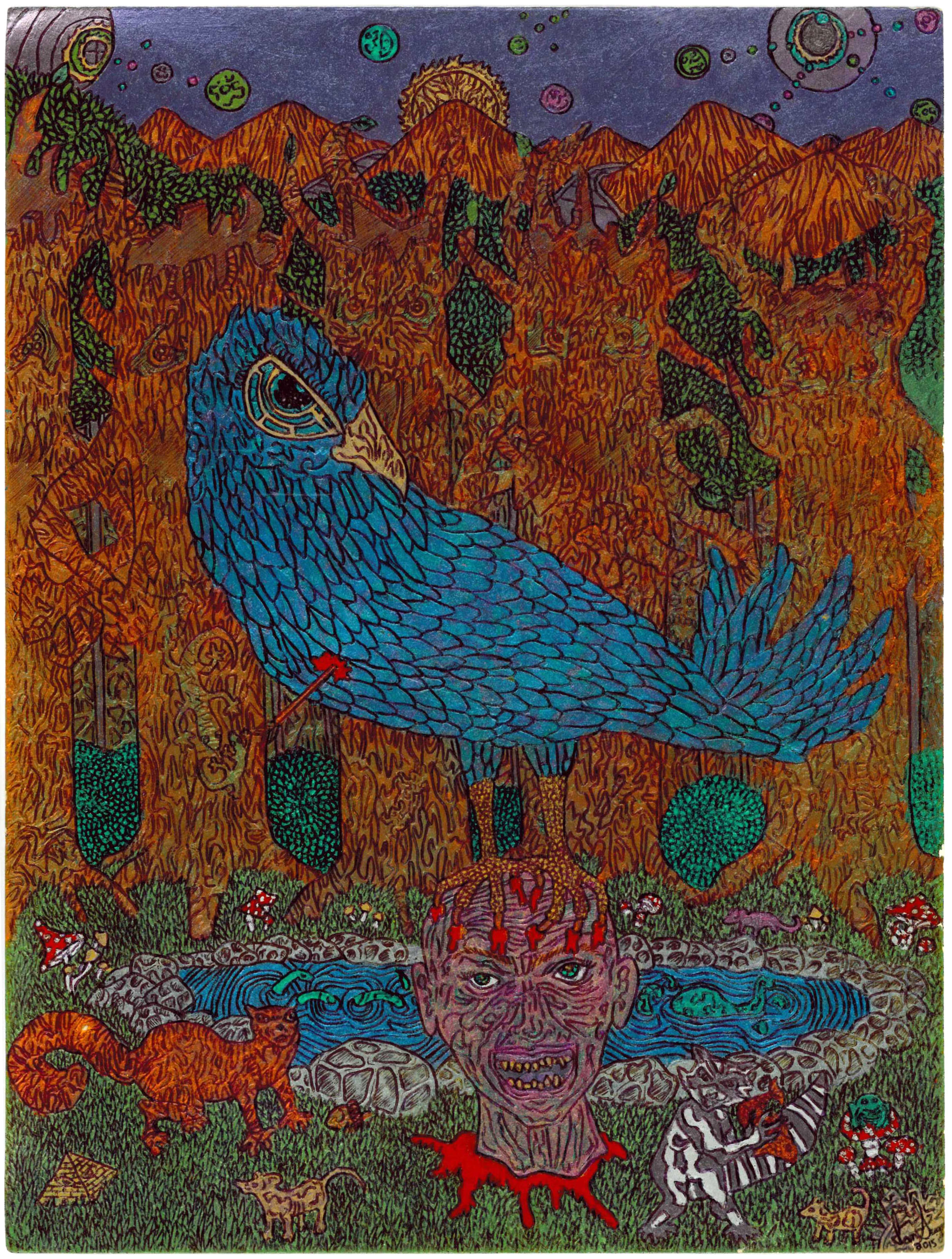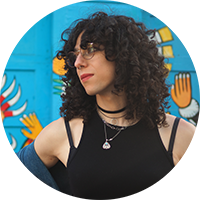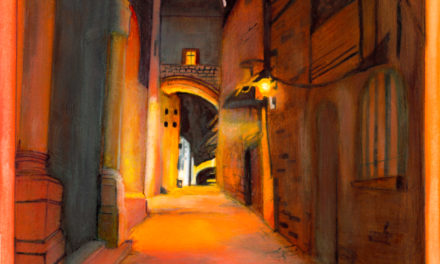El Pájaro de Don Fredo
by M. M. Olivas
Issue 13: QTPOC | 3,193 words

When Birds Rule the World by Max Moore
Tío Antonio would always claim it was well within his rights to chase off any man who came trespassing into his ranch with a hatchet or buckshot or whatever rusty tool he could scoop off the porch. His skin was always sticky and warm when he’d say it, and his lips sprayed Corona-tinged droplets in the gap between us and him.
Our parents always did their best to make sure we never witnessed Tío drunk. His stench, slurred words, fumbled footing. He’d get like that anyway though, on the days we’d come together to be whole again, para Navidad, or Thanksgiving, or a college graduation. Always carrying a bottle he’d dig up from the yard late in the evening or find after a “walk for fresh air” to the 7-Eleven down the street once our parents were too exhausted to keep watching him.
“Mira, así es tu Tío,” our mothers would say on all our separate drives home, with “Don’t end up like him” always tacked on between the flicker of passing streetlamps.
But it was his house after all—bought decades ago when our Abuelos left La Ciudad to settle in the town where they’d started our family. And when our parents grew old enough to scrape at the edges of that town with the want to leave, Tío Antonio had chosen to stay. He’d make sure to proclaim the house his, as if some malevolent god would snatch it rough out of his grip. The gods our Tío feared dressed in clean, pressed suits and matching suitcases. Sometimes offering an exchange for new Martian real estate for his quaint Earth dirt. Sometimes in dark uniforms with gleaming badges. So who were we to intervene in his own home?
We’d sit there on the couch instead, nodding along in front of him in the too bright too loud living room. We let him think he was tough, that barrel-bellied man who filled up our sight from tiled floor to cracked clay ceiling. As if he was one of those American action heroes he saw on Tuesdays on TV. Like the man he wasn’t. Because we knew when he was a boy his friends had scorched his palms with cigarette butts just four blocks down the street, at the station where our parents used to catch the bus to school. Because he’d wanted to be sweet and let his sisters do his eyebrows—never again.
We’d say, “Right, Tío.” “Sure, Tío.” Always resisting the pull in our throats to goad him on with “Háganlo, pues.” Do it and see what happens. Because maybe then he’d stop and see how pathetic he looked. Later one Navidad, on the driveway in the cool night air, between the hollow strikes of our toy lightsaber spars, we made our pact: We wouldn’t end up like him. We’d get out of this place, and not give a shit about such a shithole house.
Our witness? The Pájaro de Don Fredo—that scarlet macaw that hobbled down the block, always chirping “tengo hambre” and “dame comida” to whoever would listen, who Tío would let stay on the property because, he’d say, “the bird’s a friend; he keeps me honest.” That bird watched us from the edge of the porch light’s glow, where we tossed him tortilla chips from our communal bowl, our faces gleaming back at us from black stud eyes.
Each Navidad, we renewed our pact to stay together, support each other—no matter what—because the world outside would rip us each apart if we stood alone. Some of us would leave the pact. Take Xochi and Rodrigo, who both married and had kids. Rodrigo fought so much with his mom that when he found a white woman whose family invited him to Christmas parties in big houses with pools and white minimalist tables, with ham served instead of tamales or birria, we all knew why he didn’t come back. Xochi married, had a kid, moved into a house she could afford only a ten-minute drive from Tío Antonio’s. She was still with us but didn’t get it anymore, talked more about What’s Best for the Family over what was Best for Us.
Even though we lost our two oldest parts, our pact stayed strong. Baldito grew into Baldo. Xochi’s daughter Maria Chica, cut her name to just Maria, and cut her hair short in defiance of her mother. They filled the gap Xochi and Rodrigo had carved into us. This was how we stayed alive, adding and replacing where we could. We always existed, just a little different every time.
And with older or fresher eyes, we watched our parents, their fighting, their festering chisme that wrapped around corners to prick us in our backs, and promised we would not become them. We renewed our vows.
And the Pájaro de Don Fredo watched.
Our lives went on, summers playing video games, shoeless and fishing at the lake that time Tío tried to quit-quit-quit again. But we outgrew fishing, and Tío kept drowning his thoughts, and some of us didn’t care about “childish things” like video games anymore. But that was fine, as long as the pact stayed strong, different opinions were welcomed.
Then there was distance—moving because the town was getting expensive, going to college, making friends in high school who sneered at our little idiosyncrasies. Some of us tore off our shared traits just to smile with those kids. But we were still a pack, right? Even when our Spanish dulled.
Our parents said it was our fault for not practicing the language in the bleach white schools we’d been enrolled into across the country for “better educations.”
“You’re just being lazy,” they’d say. So very lazy! Always working, studying, trying our best to make above minimum wage the way they always dreamed. “But why not come home for Christmas anymore?” they’d ask us. Why do you think?
Why do you think?
We fled like white people, dividing and conquering land, looking out only for our own homes, our own loves. We’d abandoned our ancestral mothership home and left Tío Antonio alone in those walls.
He filled the us-shaped-spaces left gaping in the clay walls with relics: Mamá Cuca’s pottery, Papa Jesús’ oil painting, clothing. Crusty beige boxes urbanized the living room with their stacks and skyscrapers that slithered out to choke the hallways, Tía Elena’s ashes lost somewhere inside.
“What about Mars?” one of our mothers asked him one afternoon when the tax bills were piling up sideways and buyers would tap tap at his front door with deceitfully gentile knuckles and offer him some place Economically Rich with Investment Opportunities on one of the new Martian colonies. One of our former limbs, Alex, had already done this, before he snipped himself away from us.
“The pendejo fell for it,” Tío Antonio said. “They did the same thing back home with Papá and the company towns; your grandfather barely got out.”
We tried helping Tío in any way we could, dumping out the alcohol that had bruised up his kindness and left him itchy. Left his blood pinkish and thin. But he was our Elder now and told us it was His House, His History, and he wouldn’t ever give that up to no one. He shouted at us with his limp and broken English, “Everyone wants to fly away por años y años, pero the truth is we all want to come back home in the end!”
Family parties moved to another house. Mamá Xochi filled us in on Tío from then on. She told us how he began to throw away the welding tools that had twisted his hands, letting them pile on the street curb. That he shouted on the phone at night. Fished alone. Meanwhile, glass towers sprouted up from the dirt that flanked his house. All the while, the Pájaro de Don Fredo watched from the fence.
One day, Baldo went by to ask for money—money because he gambled to help with his student loans. He was good at it sometimes. Other times he wasn’t. He learned his tequilas too, even though we’d told him not to. So we carved him off of us because of it.
“But I’m not Tío,” he’d argued, ignoring the shape of him the house still saved, the house’s own etches pressed into his body, like the scar on the bridge of his nose where, as a child, he’d clipped himself against the stove while running. But he and Tío traded tequila for Corona spit. Arguing that Tío had no money to give, Baldo pushed that Tío was a shit dad and piss drunk, and both their bellies absorbed blows until Baldo stood over a weeping old man. Driving away in the dusk, Baldo swore he saw the flash of red wings at the corner of the road.
“Maybe we should check on him,” we agreed soon after. But the cops did first. True to his word, Tío Antonio was waiting on the porch with the buckshot in his grip and that was all they needed to sling up their pistols—crack!
The Pájaro de Don Fredo flapped his wings.
••••
“How old is the Pájaro de Don Fredo?” we asked Papá Baldo the night he told us in full the details of how our late Tío died. Told us because that’s how the pact, our We live on. Fed by the chisme of those who came before us, who were fed their parent’s stories when they were us.
We’d asked Tía Maria first, but she said she didn’t like to talk about Tío Antonio. We asked Xochi next, but she’d said it was best to forget the depressed old man. But Baldo had said, “Fuck it, you should know,” and sat us down in the living room of the house that used to belong to Tío, where we sat now. Walls painted over white, the handcrafted tiles ripped away and done over with fresh American wood instead.
“Fifty, maybe sixty years,” Baldo said, continuing on with the Pájaro de Don Fredo between sips of tequila. “Parrots live a long time. Your aunt Xochi says she knows some that lived to eighty. But Don Fredo’s bird! Well that’s an interesting one.” And so he told us the bird’s reputations, how it squawked first then taunted strangers with slurs or insults that cut so deep you would have thought the bird knew you, read you, found the spine of your book and dragged a scalpel’s tip along your binding. Then he’d ask for food. The audacity!
No one knew who taught the bird those phrases, though. Those slurs. Obviously, it must have been Don Fredo himself. However, that man’s face was a black void on a shapeless body.
“Oh he lived here looongggg before I was born,” Baldo said. “Before my grandparents too. He had his bird, then he died. His kids took the bird, and when they moved, they gave it to their friends who gave it to their friends and so on, and now he’s here. He belongs to the town now, to all of us.”
“Does he have a name?” We asked.
“Yeah. But no one remembers it,” Baldo sipped his tequila “He’s el Pájaro de Don Fredo.”
For years to come we’d think about the Pájaro de Don Fredo—or rather who the black outline of Don Fredo himself was. Night after sleepless night, each of us under our individual funky animal blanket covers, thought of that damn void. We didn’t call each other anymore. We were always all so busy with our own lives that we’d face our dreams of Don Fredo’s shadow, who was also Tío Antonio, and also our great grandfather Ramone too, and also our great great Mamá Carolina who’d married Ramone when she was just fourteen. “Out of love” we’d been told. Ramone swept her up on his horse and took her to his village where he played her his guitar until she bore him three children. Ramone died first, and when Carolina died, she underlined in her will that she be buried far far away from him. And these sins are what that shadow figure would show us, regrets too.
All we ever know of our past is secondhand smoke. Blown out from stories we’re told.
Sleeplessness hung under our hollow eyes from then on. Some of us got good at painting it away with concealer or sweat. One winter day, Cati crashed on Tía Maria’s couch after a rave, her eyes still pin-ball rolling in her sockets, and we came to chastise each other.
“But we promised not to be like that!” we argued with ourselves.
“If we’re not them, then what are we?”
Expectations.
And consequences.
When the bird strolled back up our driveway on the next Fourth of July, when the fireworks crackled and boomed in celebration of their independence, and this time also for the push beyond Saturn, the Pájaro de Don Fredo asked what he always asked: a squawk and a command. “Dame comida—”
Cati chucked a stone at him. It burst at his, feet and the bird cried out.
“Oh, fuck off you stupid bird!”
He flapped his wings and scurried way, and we were left to go back to scrolling on our phones. We’d share memes and funny compilation videos—anything to keep us laughing together and pass the time because Cati only liked talking to her friends, and Sebastian liked sports, and Ethan no one really knew, ya know?
Maybe you were too cruel to the bird, one of us thought. Annoying little creature, from another of our limbs. He’s evil, from another. But that was harsh…
Yeah it was.
It’s not about the bird is it? Cati, do you wanna talk about it?
Things we never uttered aloud. And when it was time to go home, we gave each other our stiff hugs and said, “Stay well,” before returning to our corners of the continent. Even if the distance kept us far from that house, it wasn’t enough.
The once-was town kept growing, with more and more skyscrapers, shuttle docking ports, fast-food chains, parking garages, shopping malls, automobile dealerships, million-dollar homes with pride flags. We tried, in our corners, to forget about Tío Antonio and his—our—family house. Even without going back to it, the house took root in us in other ways:
In silent arguments. In cold and empty words of “Do you know what we sacrificed for you? Then why don’t you do more?”
We became the older Us cannibalizing the younger, and the house’s roots reached into the corners of our separate homes, stemming into jungles. What do you do then? With weeds in every crevice? You can burn it down. Or cut them away and salvage what’s left. But we didn’t burn it. And our parents still had the nerve to call us ungrateful when we followed the call to chart the stars. They must have still wondered why it was we never visited home.
••••
In cold, metal hulls split from each other for light years and light years, with spacetime stretching, being pulled, crumpling, springing back into shape beneath our engines, we split the Us into Mes and Is. A buzzard picked carcass with all our limbs broken and gone and carried far, far away. All of us had forgotten what exactly it was we’d promised each other to keep alive.
It was the result of tablespoons of American Individualism fed to us each morning: Juan traded his tongue for professional Anglo words when he signed on with the terraformers; Claudia studied extraterrestrial ecology—never learning a frijol substitute that tasted like home; Cati married someone we never met and moved to Titan. She told us how pretty the oceans were, but we saw how she’d burned the curls from her hair. And Lizeth? Well, they’d been gone for a while, ever since Miguel watched too many cringe videos that lead to sleazy podcasts and said it was his opinion to keep calling Lizeth “he.”
••••
Lizeth waited the edge of the frontier, where life meant coldness in the belly of a satellite. They got used to the bang bang bang! of metal panels and the tons of shifting gears pressing in around them. They’d long since jettisoned every faded photo, relic, blanket that reminded them of the warm Earth sun and their mom’s besos. They’d carved so much of themselves away from that past that they no longer registered the scratchiness in their throat. No more tears. No more hunger for meaning out there when they could finally be themselves fully. They let that emptiness cradle them. Fill their void in where they’d let loneliness hollow themself out.
That Navidad, they celebrated alone, watching old reruns broadcast out there in the dark. They tried to cook what their mother would each year, but everything they cooked tasted of staleness. How Lizeth wished for chisme to flutter alive and fill the empty hull.
Eventually word traveled that Miguel had died in a car accident. Juan to cancer. Like old stars, we were burning out until there were only eight, six, five of us left with nothingness in our eyes. Once we’d been a wide expanding family that crowded every room in Tío’s house with jokes and chisme and dreams that we’d all reach out and take. Five now.
Cati, Ethan. Sebastian, Claudia, Lizeth.
Scattered across the stars.
At least we were until Abuelo Baldo’s heart gave out in that old rundown house, constricted by an expanding city. A good enough reason to return. Lizeth’s captain asked if they were leaving to fix up the house.
“No. But we all want to come back home in the end.”
So there we were, the last of us. Broken strangers standing together in the open door of our shelter with torches in one hand, and each other’s hands in our other.
Burn it down. That was the plan. Let the fire eat away the old shadow stamps of us in the saggy flooring and wood beams. Let the fire eat out the ghosts trapped in the house’s belly along with the stories, the chisme, the laughs, and Tío Antonio’s miniature boat collections, Maria’s knitted quilts, the baby shoes, the recipe books, the collection of video games and toy lightsabers—the bones of us.
We hesitated. Blazing torches held high, our flames licking the ceiling, we watched that damn bird staring at us from the living room hearth.
It cawed. Once. Twice. Then blink-shuttered its eyes as if to drink us all in. How pathetic we must have looked in his ancient sight. And then el Pájaro de Don Fredo spoke.
Si lo van a quemar, háganlo pues. Háganlo ahora.
His voice dragged like a dozen ancient rattling skeletons.
Si quieren empezar de nuevo, quémenme rápido.
And don’t look back.
¿No ven que están todos aquí y ahora? All of you?
Our hands twisted tight around our torches. We just had to let them fall. Or set them down.
Si quieren quedarse muertos, mátenme ahora—burn it down.
Burn it down.
Burn it down!

M. M. Olivas
M. M. Olivas is a first-generation Mexican American storyteller, daydreamer, and Chicana Futurist whose work explores the intersections of Latine and trans experiences. M. M. is an alumnus to 2022 Clarion Science Fiction and Fantasy Writers’ Workshop and the 2023 Under the Volcano Writers Residency, and was the recipient of the 2022 George R.R. Martin Sense of Wonder Scholarship. M.’s work can be found in Uncanny Magazine, Apex Magazine, Bourbon Penn, and Weird Horror Magazine among others. Currently earning an MFA in Creative Writing at San Jose State University, M. resides in the San Francisco Bay Area and spends her free time feeding her affinity for horror movies and collecting transforming robots.




